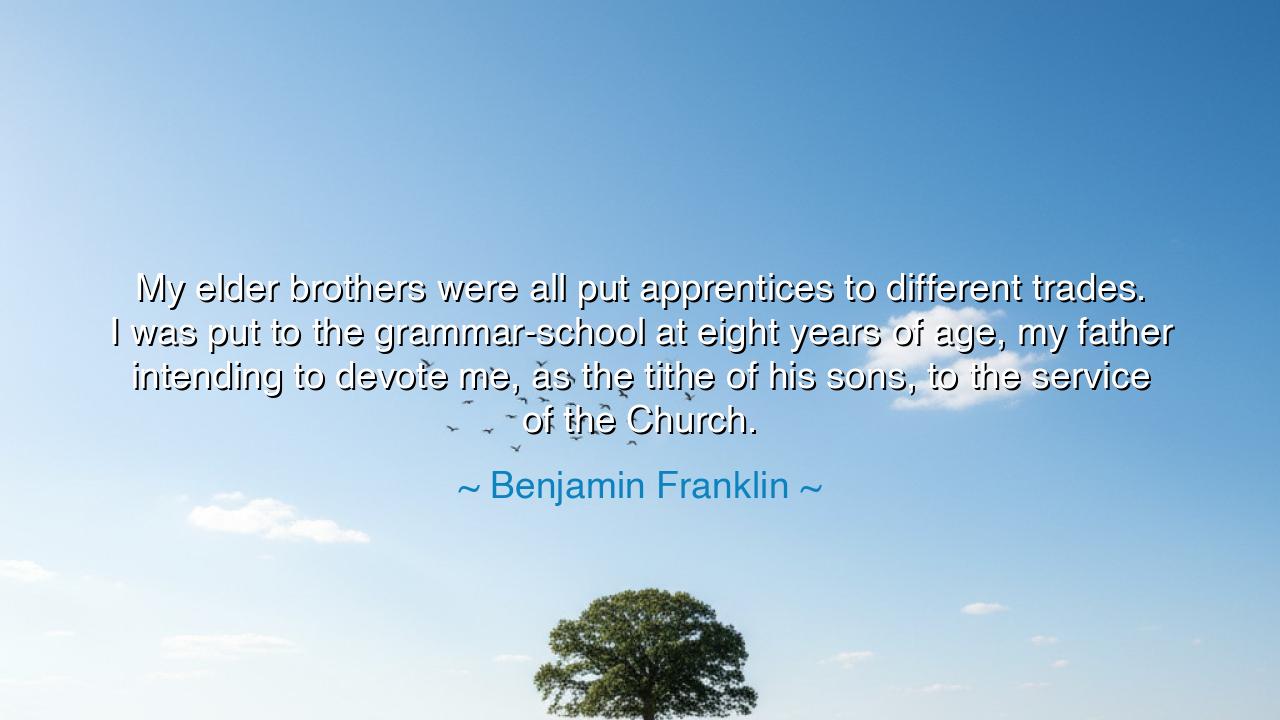
My elder brothers were all put apprentices to different trades. I
My elder brothers were all put apprentices to different trades. I was put to the grammar-school at eight years of age, my father intending to devote me, as the tithe of his sons, to the service of the Church.






"My elder brothers were all put apprentices to different trades. I was put to the grammar-school at eight years of age, my father intending to devote me, as the tithe of his sons, to the service of the Church." – Benjamin Franklin
In the annals of human history, there are moments when the course of a person’s life is determined by the invisible hand of fate, shaped by the decisions of others. Benjamin Franklin, one of the great architects of the American Enlightenment, reflects on his early years with a profound sense of purpose and sacrifice. His father, in an act that mirrors the ancient traditions of his time, chose to dedicate one of his sons—the tithe, or the "first fruits" of his progeny—to the service of the Church. This practice, rooted deeply in the religious and cultural values of the era, was not merely a familial duty but a profound sacrifice of personal dreams for the greater good of the community and faith.
In the ancient world, it was not uncommon for the eldest sons to inherit the family’s wealth, status, or craft, while the younger sons were often apprenticed to trades, learning the skills necessary to contribute to society. Yet, there was an expectation that the best and brightest among them would be devoted to higher callings—to religious service, to the temples, or to the philosophical and spiritual pursuits that were seen as the highest forms of knowledge and duty. Franklin’s reflection on his life is a window into the tension between personal ambition and the higher duties expected by one’s family and society.
Franklin’s story is echoed in the history of many great thinkers and leaders who were shaped by the expectations placed upon them in their youth. Consider the case of Socrates, the great Athenian philosopher, whose father, also a sculptor, likely intended him to follow in his footsteps. Yet, Socrates, in his quest for wisdom, chose a path that led him not to the craft of his father but to the pursuit of truth in the public square. Like Franklin, Socrates was drawn to a different calling, one that went against the grain of tradition and family expectation. Yet, the wisdom of both Franklin and Socrates lay in their ability to understand that their true calling was not something that could be chosen for them by others, but something that must come from within.
Franklin, much like Socrates, was devoted to a higher purpose—but his devotion took a different shape. While his father’s intent was to have him serve the Church, Franklin’s life took a turn toward science, invention, and public service. In his early years, his education in the grammar school was meant to prepare him for a life in the Church, but Franklin’s keen mind and unquenchable curiosity led him down a different path. In this way, he, too, mirrored the ancient tradition of those who broke free from familial expectations to pursue their own purpose and vision for the future.
The lesson here is one that echoes through time: The calling of the individual is often shaped by the forces around them, by the decisions of those who came before them, yet it is not always constrained by these forces. Franklin, though intended for a life of religious service, chose to use his education in science, philosophy, and public life to serve humanity in a different way. The same is true for countless figures throughout history—men and women who, faced with the weight of tradition, chose to forge their own path, guided not by the expectations of others, but by their own innate drive and vision.
The practical lesson we must take from Franklin’s words is this: Honor the wisdom of your past, but do not be bound by it. Our ancestors, much like Franklin’s father, may have laid out a path for us—a path of duty, of family responsibility, of adherence to tradition—but it is up to each of us to decide whether that path is truly ours to walk. We must have the courage to step forward, to pursue the knowledge and purpose that resonate with our innermost being, just as Franklin did in choosing to shape a new destiny for himself. Like Franklin, let us educate ourselves in the ways of the world, not to fulfill the dreams of others, but to build upon the foundation they have laid for us, and in doing so, contribute to the greater good of humanity.
In the end, the legacy of Franklin—and those like him—teaches us that the pursuit of knowledge and purpose is a deeply personal journey. The world may have its expectations, and our families may have their hopes for us, but the true calling of a person lies in their own vision, their own creativity, and their own unwavering belief that they are meant to do something extraordinary. So let us walk the path that speaks to our soul, for in doing so, we honor not just our ancestors, but the full potential of who we are meant to become.






AAdministratorAdministrator
Welcome, honored guests. Please leave a comment, we will respond soon